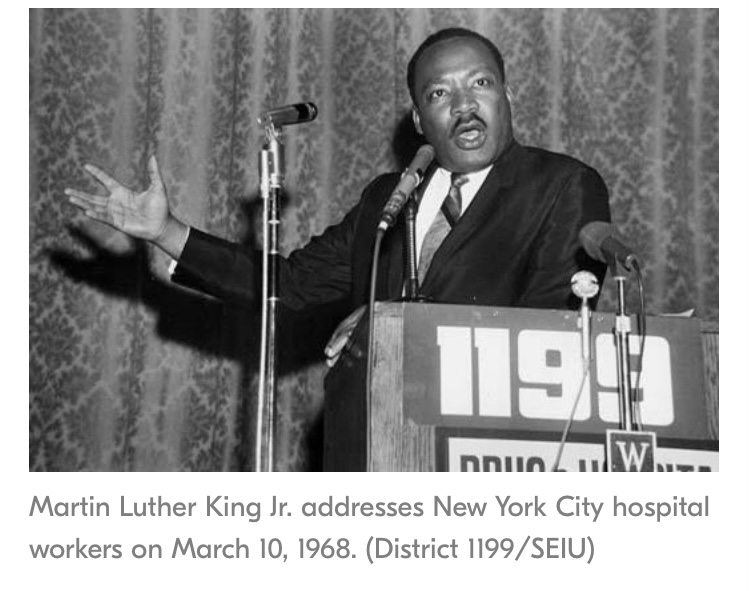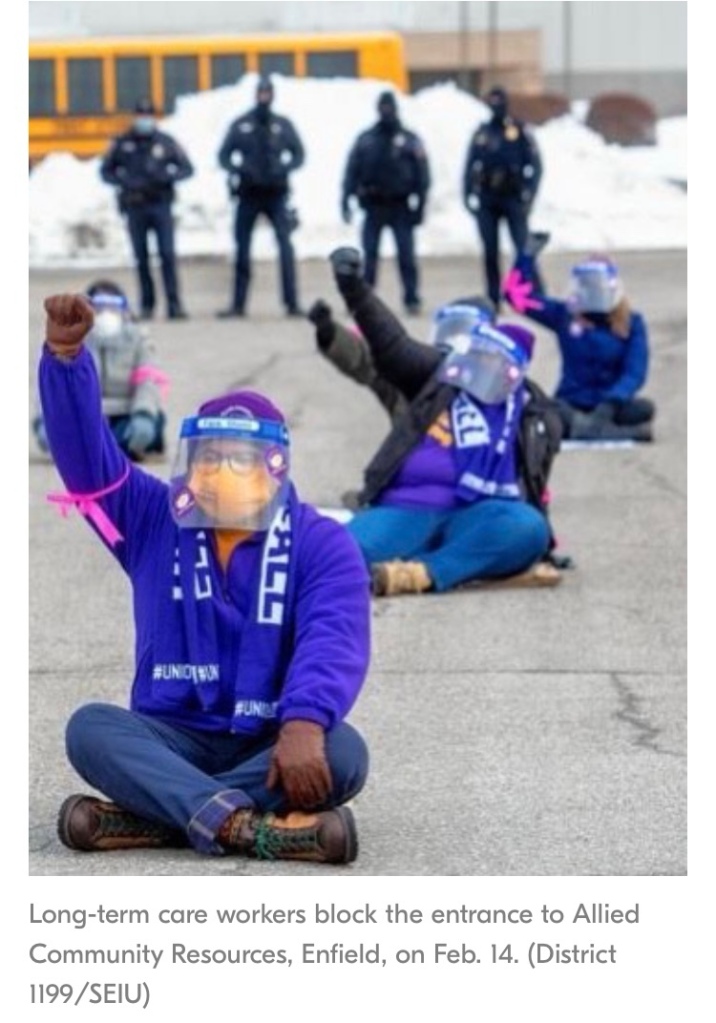
Walking into the King-Davis union building in Hartford CT, the first thing you see is a very large photo of Dr. Martin Luther King Jr. standing behind a podium with “1199” on front. The spirit of Dr.King– and founding union president Leon Davis– played a major role in the most recent union victory for thousands of Connecticut health care workers from District 1199NE SEIU.
Built into the union’s latest contract campaign are King’s principles. “The purpose of the direct action,” he wrote, “is to create a situation so crisis-packed that it will inevitably open the door to negotiation.”
District 1199 began negotiating with the owners of 44 nursing homes earlier this year for successor collective bargaining agreements which expired March 15. With no resolution in sight, the workers voted to strike if a deal could not be reached within two months.
As a result of escalating pressure on the owners, 5,000 nursing home workers finally reached an historic agreement just one day before their May 14th strike deadline.They won a $20 per hour minimum wage ($30 for licensed practical nurses). The current national average is $13.61. Additional funds were set aside for new safety-related practices at the homes.
A double dose of pain
Nursing home workers have received a double dose of distress during the COVID-19 pandemic. While caring for the elderly and most vulnerable, they have been working in poorly protected facilities, and they have brought the disease home with them.
Francene Bailey is one of Connecticut’s wounded warriors. At the nursing home where she works, 40 patients have died from Covid-related causes. At the start of the lockdown in 2020 Francene herself contracted the virus. Her mother died from Covid one month later. In Connecticut, half of the total 7,800 pandemic deaths have been nursing home residents.
In order to protect their families, Francene and her co-workers tried to negotiate for months with their for-profit agencies (heavily funded by the state through Medicaid) to secure the protections and income needed to survive. In July, 2020, the union drafted a “long-term care workers bill of rights,” which included demands for proper staffing, stockpiling of PPE, and affordable health care for all nursing home workers.

Dr. King often called 1199 “my favorite union.” Poverty-wage health workers who first organized in New York were just as much an inspiration to King as he was— and still is— to them. After his death, Coretta Scott King served as chair of the 1199 union’s national organizing campaign. She was soon on the streets of Charleston, South Carolina in 1969 with the Southern Christian Leadership Conference (SCLC), aiding an 1199 organizing drive at two local hospitals.
A long history together
Today, at the center of the struggle are certified nursing assistants, primarily women of color, many of them immigrants from Jamaica and Haiti. They find that going on strike is a momentous decision. It means exchanging a paycheck for picket line pay, which is a fraction of their wages. There are other hardships as well: employers are not required to contribute to workers’ health and welfare benefits when workers walk out.
“No one listens until we threaten to strike”
For the workers, the most painful aspect of a strike is the well-being of the patients they leave behind. “No one listens to us unless we threaten to strike,” Francene Bailey explained. “We give loving care, but we get no love back from the boss. Really, our patients and their families are our biggest supporters. They know how hard we work and how much we care. Often we are the only outside faces they see.”

The union workers count on the fact that every time District 1199 sends a required strike notice, the CT Department of Public Health orders the nursing homes to submit a comprehensive plan for patient care, including the hiring of temporary replacements.
Connecticut nursing home workers are no strangers to strikes, which they have utilized since 1969. Withholding one’s labor and refusing to cooperate with authorities has become an essential element of their organizing strategy. In one way or another, District 1199 members have lived this practice, with walk-ins on the boss, informational picket lines, and other organized tactics inside the nursing homes.
From February to May, the union turned up the pressure as the strike deadline approached. They blocked roads, sat down at intersections and occupied state office buildings in cities across the state, resulting in scores of arrests.
Before they engaged in their civil disobedience campaign, the nursing home workers participated in nonviolence workshops, which was not easy to do while maintaining social distance. The training emphasized personal responses to violence, self care, and the legal process.
The participants also discussed the historic role direct action has played in the abolition, suffrage, labor, civil rights, and peace movements. “We realized we aren’t alone, we are part of a long tradition,” said one participant.
In a profession that “gets no love back,” these Connecticut care givers are determined, in Dr. King’s words, to bend the arc toward justice for themselves and the vulnerable people they serve.